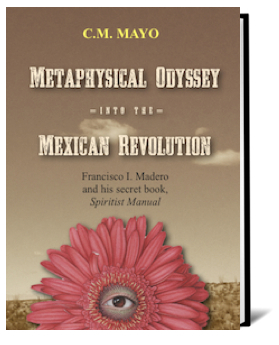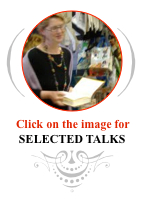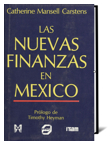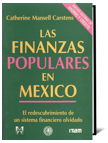|
Where
can I find your finance books?
Las
nuevas finanzas en México
(Editorial Milenio, ITAM, IMEF, 1992) and Las
finanzas populares en México (Editorial Milenio,
ITAM, CEMLA, 1995) are both still in print and from time to time,
can be found in Mexican bookstores, including Sanborns and Ghandhi.
Las finanzas populares en Mexico is also available in
the bookstore at the MIDE museum in Mexico City's Colonia Centro.
If you're really in a pickle, you can find used copies of both
my books on-line at amazon.com
and abebooks.com.
Are
they be available as e-books?
They will both be available as
e-books soon. Please revisit this page for updates (and be sure
to click on "refresh.")
Do
you plan to update your finance books?
Alas, my commitments
to other writing projects make that impossible. But I do plan
to offer some comments about Las finanzas populares en México
on this website, in particular, about how the digital revolution
has helped promote both a massive expansion and some very unfortunate
social and institutional problems in lending to low-income individuals.
Why
do you use different names, Catherine Mansell, Catherine Mansell
Carstens, and also C.M. Mayo?
This is probably more
than you want to know, but here goes:
Catherine Mansell is my maiden name, and Catherine Mansell Carstens
is my married name. My husband is the Mexican economist Agustín
Carstens.When I began publishing as an economist in the 1980s,
I used my maiden name together with my married name, as is common
practice in the U.S. This led to some confusion, however, because
in Mexico, it is customary to add the "de" before one's
married name; in addition, it is also customary to add one's
maternal name after the paternal name, so on my Mexican documents
my legal name appears as Catherine Mansell Mayo de Carstens,
while in the U.S. it remains as Catherine Mansell.
In the 1990s, I began publishing
literary fiction and poetry as C.M.
Mayo, using my mother's maiden name. Why the pen name? I
wanted the freedom of (then) anonymity to try something completely
different. Needless to say, people who knew my work as an economist
were bamboozled. Whatever.
I also sometimes comment on blog posts with names made up on
a whim. And I blog as Madam
Mayo because one day the poet E. Ethelbert Miller addressed
me in an e-mail as "Madam Mayo," which I thought was
hysterical. Now I receive e-mail from strange people from foreign
countries addressed to "Madam." Never a dull moment.
Do
you still work or write as an economist?
No, I have not worked
as an economist in some years, though of course, my background
as an economist informs the way I think about the world. (See
in particular Miraculous
Air.) I set aside my career as an economist in part to
avoid any conflict of interest with my husband, who has held
some important public sector positions over the years, but also,
and more importantly, I relish writing in a more literary vein
and across a far broader range of genres and subjects.
You
came out of the University of Chicago, so you're all gung ho
for free markets and capitalism, right?
The University of Chicago
got this reputation in large part because of Milton Friedman's
columns for Newsweek and best-selling books, back in the
1970s and 1980s. Milton Friedman, God rest his soul, had left
Chicago for Stanford by the time I showed up, and anyway, last
I checked, the faculty of the economics department, which has
included many Nobel Prize winners over the years, is an ever-changing
group of extremely intelligent, highly competitive, and curious
academics. If I had to make one more gross generalization about
them, it would be that they're mostly middle aged men who don't
get enough sun. Although one them, famously, had a sex change
operation. I say this with affection, and especially for Donald
a.k.a Deirdre
McCloskey, whose work has been a very important influence
for me. In addition to a masters degree in economics, I earned
my undergraduate degree in the college, which has a strong liberal
arts tradition, so for me, the University of Chicago was most
of all preparation for a life of the mind. It is a university
with a strong interdisciplinary tradition, and has outstanding
faculty in areas as diverse as astrophysics and Far Eastern Studies
and I was fortunate to be able to take year-long courses on,
in fact, astrophysics, and Asian Consciousness. As for the economics
department, those of us who have actually earned a degree there
find some of the portrayals in the media and the mosh pits of
blogdom, well, pretty silly.
So what's my take on capitalism? It depends on what you mean
by the word. And I am not even convinced it's particularly useful
word at this stage in human history, when it has accumulated
so many layers of cement-like connotations, both good and bad.
My underlying philosphy is: with
all due respect for the rights of others, freedom is a very good
thing.
As for economic policymaking, the two most important things I
took from my years studying economics in Chicago are that first,
human beings tend to respond to incentives in certain ways, and
second, if you don't take that into account, you may as well
go battle the winds and the tides.
Oh, and a third: inflation is, in fact, a tax and, alas, a very
pernicious one because it tends to hit the poor the hardest.
I believe the best economic policymaking, however you want to
label it, is based on refined common sense.
How
did you make the transition from economist to literary writer?
It wasn't all that difficult because first, my liberal arts education
gave me confidence (I spent as much time reading Hemingway, Joyce,
and Tolstoy et al, as I did with my economics textbooks),
and second, anyway, economics is all about storytelling (and
if you think it's not, read McCloskey's delightful work on the
rhetoric of economics, If
You're So Smart How Come You're Not Rich?).
What
are you writing now / your current interests?
 As C.M.
Mayo I recently published Metaphysical
Odyssey into the Mexican Revolution: Francisco I. Madero and
His Seceret Book, Spiritist Manual, which includes my translation,
the first, of the 1911 Spiritist Manual. Madero was the leader
of 1910 Revolution and President of Mexico from 1911 until his
death in the coup d'etat of 1913. Read all about it at the book's
website here. As C.M.
Mayo I recently published Metaphysical
Odyssey into the Mexican Revolution: Francisco I. Madero and
His Seceret Book, Spiritist Manual, which includes my translation,
the first, of the 1911 Spiritist Manual. Madero was the leader
of 1910 Revolution and President of Mexico from 1911 until his
death in the coup d'etat of 1913. Read all about it at the book's
website here.
At present I am at work on a
travel memoir of
Far West Texas, and apropos of that, I host podcast series
"Marfa Mondays." Listen in to those podcasts anytime
here.
 You
can read all about my work as C.M. Mayo at www.cmmayo.com You
can read all about my work as C.M. Mayo at www.cmmayo.com
Do
you have any advice for economists, lawyers, and others who want
to write a novel?
Yes, and you are most welcome to read all of it on my Resources
for Writers page. |
 < Home >+< About >+< Publications >+< FAQ >+< Contact >+< En español >
< Home >+< About >+< Publications >+< FAQ >+< Contact >+< En español >




